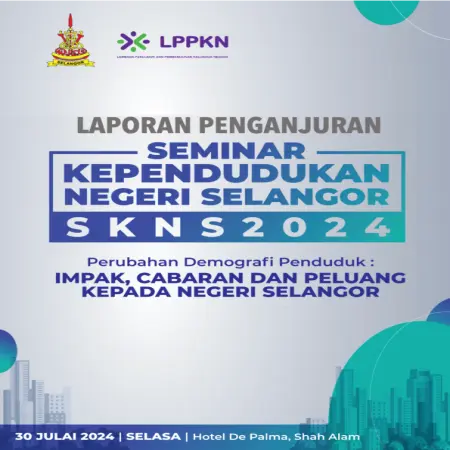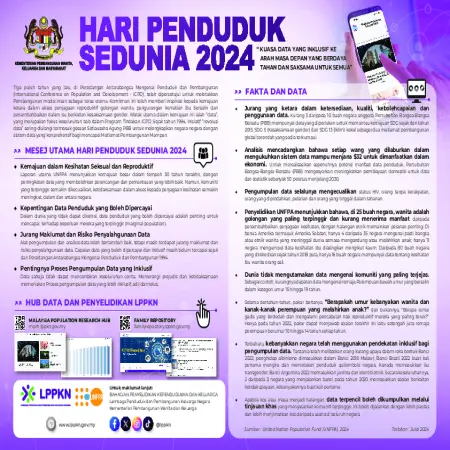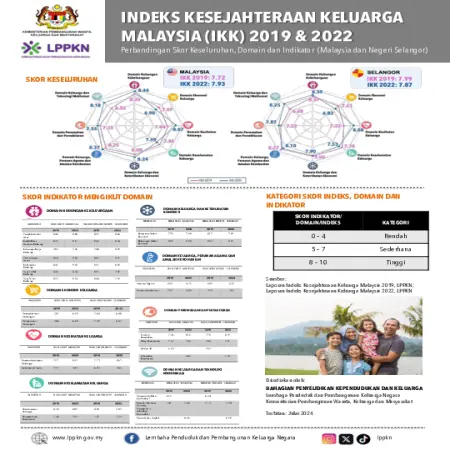TOPICS
|
|
Indeks Kesejahteraan Keluarga Malaysia (IKK) 2019 & 2022 : perbandingan skor keseluruhan, domain dan indikator (Malaysia dan Terengganu)
Item Type: Infographic
Editor:
Year: 00/11/2024
Abstract: The overall IKK score for Malaysia is 7.72 (2019) while the score for 2022 is 7.93. The overall score of IKK for the State of Terengganu is 8.10 in 2019 and the overall score of IKK in 2022 has decreased to 7.85.
|
|
|
|
|
|
Indeks Kesejahteraan Keluarga Malaysia (IKK) 2019 & 2022 : perbandingan skor keseluruhan, domain dan indikator (Malaysia dan W.P Kuala Lumpur)
Item Type: Infographic
Editor:
Year: 00/11/2024
Abstract: The overall IKK score for Malaysia is 7.72 (2019) while the score for 2022 is 7.93. The overall score of IKK for the State of Kuala Lumpur is 7.59 in 2019 and the overall score of IKK in 2022 has increased to 7.99.
|
|
|
|
|
|
Indeks Kesejahteraan Keluarga Malaysia (IKK) 2019 & 2022 : perbandingan skor keseluruhan, domain dan indikator (Malaysia dan W.P Putrajaya)
Item Type: Infographic
Editor:
Year: 00/11/2024
Abstract: The overall IKK score for Malaysia is 7.72 (2019) while the score for 2022 is 7.93. The overall score of IKK for the State of Putrajaya is 8.37 in 2019 and the overall score of IKK in 2022 has decreased to 8.02.
|
|
|
|
|
|
Laporan Penganjuran Seminar Kependudukan Negeri Selangor SKNS 2024
Item Type: Report
Editor:
Year: 00/09/2024
Abstract: The Selangor State Population Seminar 2024 (SKNS 2024), held in conjunction with World Population Day 2024, was organized to discuss policies and measures needed to slow down the declining fertility rate and to prepare the state of Selangor for the rapid pace of demographic change. SKNS 2024 was jointly organized by the Selangor State Government and the National Population and Family Development Board (LPPKN) Selangor, in collaboration with the United Nations Population Fund (UNFPA).
The theme of this inaugural seminar was “Demographic Change: Impacts, Challenges, and Opportunities for the State of Selangor.” Among the issues discussed were the declining fertility rate and its impact on national development, covering four key areas:
i. Socioeconomics
ii. Health and infertility
iii. Policy development
iv. Shared responsibilities
The objective of the seminar was to explore and discuss current demographic dynamics and challenges, as well as their relationship with development, particularly in Selangor. This seminar provided a platform for policymakers, academics, and researchers to present their research findings in the fields of population, family, and reproductive health, and to produce recommendations that could serve as input for policy formulation and the development of appropriate intervention programs by the Selangor State Government.
In addition, the seminar also aimed to gather input and proposals on slowing down the fertility rate in Selangor from participants comprising state government agencies, state-owned enterprises, academics, non-governmental organizations (NGOs), and civil society.
This report serves as the comprehensive and detailed record of SKNS 2024, covering all sessions: opening remarks, officiating speech, keynote address, paper presentations, forums, Q&A sessions, and the closing session, along with recommendations for consideration by the Selangor State Government. The report also includes media coverage generated by SKNS 2024.
|
|
|
|
|
|
“The thirtieth anniversary of the International Conference on Population and Development Programme of Action (ICPD-Poa)”
Item Type: Newsletter
Editor:
Year: 00/07/2024
Abstract: Over the last thirty years, Malaysia has implemented many programs and intervention strategies to integrate population factors in socio-economic development planning to enhance the wellbeing of its citizens. The Government will continue to work towards creating policy prescriptions that are fair, equitable as well as inclusive, in commitment of leaving no one behind in efforts to remain a peaceful and prosperous nation.
|
|
|
|
|
|
Hari Penduduk Sedunia 2024 : “kuasa data yang inklusif ke arah masa depan yang berdaya tahan dan saksama untuk semua”
Item Type: Infographic
Editor:
Year: 00/07/2024
Abstract: Since 1994, the "data revolution" initiative has often been repeated including the UN Secretary General's call to equip countries with comprehensive data systems to achieve sustainable development goals. The main messages of World Population Day 2024 are progress in sexual and reproductive health, the importance of reliable population data, information gaps and the risk of data misuse, and the importance of inclusive data collection processes.
|
|
|
|
|
|
Penemuan Tinjauan Pendapat Umum Bersempena Sambutan Hari Ibu 2024
Item Type: Infographic
Editor:
Year: 00/07/2024
Abstract: In conjunction with the 2024 National Mother's Day celebration, the Ministry of Women, Family and Community Development (MWFCD) through the National Population and Family Development Board (NPFDB) has conducted an online public opinion poll from 12 to 31 May 2024. With the theme "Terima KASIH Ibu", a total of 3,988 respondents consisting of mothers of Malaysian citizens aged 18 years and above who have children were involved in this survey.
|
|
|
|
|
|
Penemuan tinjauan pendapat umum bersempena Sambutan Hari Bapa 2024
Item Type: Infographic
Editor:
Year: 00/07/2024
Abstract: In conjunction with the 2024 National Father's Day Celebration, the Ministry of Women, Family and Community Development (MWFCD) through the National Population and Family Development Board (NPFDB) has conducted an online public opinion poll from 12 to 30 June 2024. With the theme "Terima KASIH Ayah", a total of 1,238 respondents consisting of fathers of Malaysian citizens aged 18 and above who have children were involved in this survey.
|
|
|
|
|
|
Indeks Kesejahteraan Keluarga Malaysia (IKK) 2019 & 2022 : perbandingan skor keseluruhan, domain dan indikator (Malaysia dan Negeri Selangor)
Item Type: Scientific Poster
Editor:
Year: 00/07/2024
Abstract: The overall IKK score for Malaysia is 7.72 (2019) while the score for 2022 is 7.93. The overall score of IKK for the State of Selangor is 7.99 in 2019 and the overall score of IKK in 2022 has decreased to 7.87.
|
|
|
|














